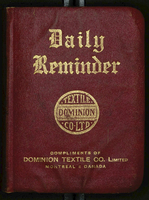A Selection of Mary Josephine McDonald's Diaries: Introduction
The years 1917-1919 are most often associated with World War I and the devastating Great Influenza pandemic. With an estimated 50,000 influenza-related deaths in 1918-19 in Canada (according to The Canadian Encyclopedia), and with another 66,000 casualties among Canadian soldiers, it is a given that the cultural and economic state of the country’s main cities during this time were documented by many. By extension, such recordings from city residents and onlookers have become the ephemeral face of this difficult period. As a result, however, much remains unknown about the pandemic experiences of Canada's and Ontario's rural communities.
Thanks to the Rural Diary Archive project curated by the University of Guelph, one woman’s minimalist recordings offers some insight into the small-scale realities of the time rather than details of worldwide dramas. Mary (Minnie) Josephine McDonald, whose diary identifies her as living near Cornwall Township, a “prosperous farming and dairying district” in Eastern Ontario, was between the ages of 54 and 56 during its three-year-long usage. Unfortunately, an abrupt and final entry in March 1919 confirms a harrowing fate: McDonald’s young daughter had written that her parents died within a day of each other.
The catastrophic developments from both within and beyond McDonald’s local area surprisingly fail to appear as vivid, recurring themes in her diary. She instead primarily focuses on church, farm labour, inventory, finances, weather conditions, travel, social exchanges, and the occasional correspondence. Through McDonald's perspective, this exhibit will explore the complexity of pandemic life as well as context-specific diary-keeping practices. Straying from the twentieth-century standard of self-referential, introspective narratives, her diary possesses a unique style and function that challenges preconceived notions of Western early-twentieth century womanhood, illness, and loss.
This exhibit takes what Pooley and Pooley (2020) describe as a "micro-historical approach" - studying the specifics of one woman's diaries to gain insights into general community and demographic realities. McDonald's diaries, in few words, can tell us a story about womanhood, pandemic and rural lifestyles and practices, and what it is like to grapple with awareness of both local community and global goings-on.

